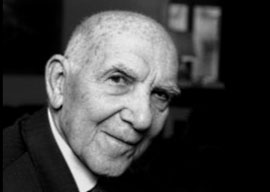
January 16, 2011

Late last year, a small book by a ninety-three-year-old man unexpectedly reached the summit of France’s bestseller list. Stéphane Hessel’s Indignez-Vous! (Be Indignant!) sold more than 600,000 copies from October through December, propelling it by several hundred thousand copies over Prix Goncourt winner Michel Houellebecq’s novel, La carte et le territoire. Stéphane Hessel had written other books, and his publishers, Indigène Editions in Montpellier far from Paris, had published other volumes. But neither had ever reached the public in such numbers.
Hessel’s life would make a novel, preferably not by nihilist Houellebecq. His father, Franz Hessel, was a German Jewish writer who emigrated to France with his family in 1924 when Stéphane was seven. Franz’s friend Henri-Pierre Roché used Franz as a model for Jules in his novel Jules et Jim, the tale of a woman who loved two men that Truffaut translated to the screen in 1962. (Hessel’s mother Helen was the template for the novel’s heroine Catherine.) Stéphane grew up in a literary milieu that was shattered when Germany occupied France in June 1940. Having studied at the prestigious Ãcole Normale Supérieure, he served in the French Army and became a prisoner of war. Following his escape from a POW camp, it took him six months to reach London to join General Charles de Gaulle and his small band of résistants. De Gaulle dispatched him to France to organize Resistance networks. The Gestapo captured him and subjected him to the baignoire, a form of torture that would later be called waterboarding. He was shipped off to Buchenwald and Dora concentration camps, surviving only by switching identities with an inmate who had already died. While being transferred to Bergen-Belsen, he escaped.
He became an ambassador after the war and helped draft the UN’s Universal Declaration of Human Rights. Awards and honors followed, but he retained the indignation that drove him during the war. In Indignez-Vous!, his defenses of Palestinians under Israeli occupation and of illegal immigrants in France attest to his belief in universal rights. The book’s popularity apparently answered a public need for a voice to articulate popular resentment of ruling-class ruthlessness, police brutality, stark income disparities, banking and political corruption, and victimization of the poor and the immigrant. Hessel had arrived in France when many Frenchmen were decrying Jewish immigration as the “threat from the East” (about which Joseph Roth wrote movingly in The Wandering Jews). The real threat from the East was the Nazism that many on the French right admired as an antidote to what they perceived as French society’s indiscipline.
“Victory for free speech? In the bizarre world of French philosophical discussion, preventing a speaker from speaking could be nothing else.”
In Indignez-Vous!, Hessel wrote, “Ninety-three years. The end is not far. How lucky to be able to take advantage of the pedestal of my political involvement: the program of the National Council of the Resistance sixty-six years ago.” He rejects claims that the state “can no longer afford policies to support its citizens” seeing as it managed to support them after the Liberation, “when Europe was ruined.” He calls on the young, many of whom have already been marching in the streets with inchoate fury at President Nicolas Sarkozy’s “reforms.” They resent Sarkozy benefiting the banks while depriving the unemployed, the old, the students, the immigrants, and the poor. Hessel’s pacific call to renew the spirit of Resistance resonates in French traditions that immigrants embrace.